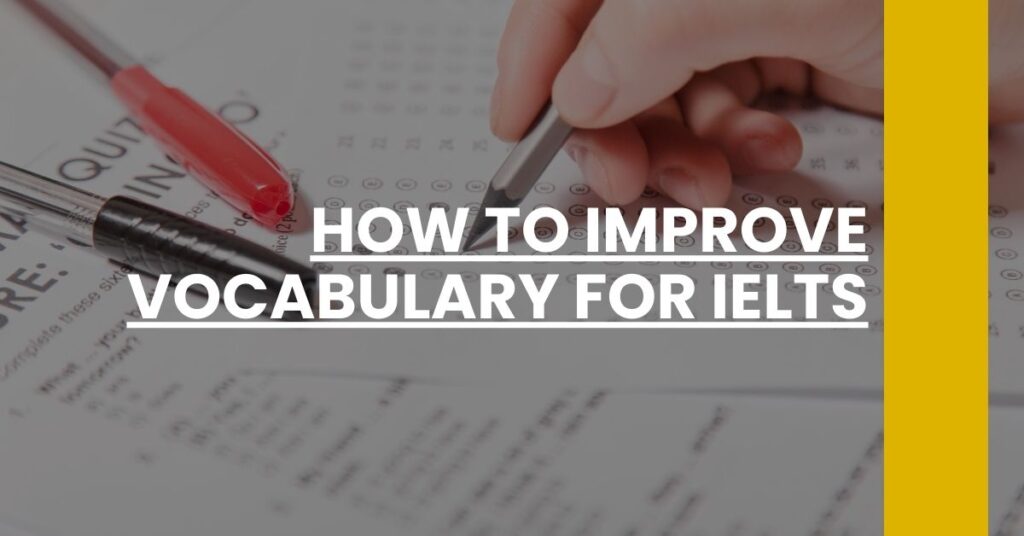Unlock how to improve vocabulary for IELTS with targeted strategies crafted for success.
- Daily Reading Habits: Elevate your IELTS vocabulary by immersing yourself in diverse reading materials.
- Vocabulary Retention Tools: Utilize flashcards and apps to memorize and review new words efficiently.
- Practice Through Conversation: Incorporate fresh vocabulary into daily talks, enhancing your speaking skills.
Begin your journey on how to improve vocabulary for IELTS today.
- Understanding the Importance of Vocabulary for IELTS
- Daily Reading and Listening Practices
- Active Learning with Flashcards and Apps
- Incorporating Vocabulary into Daily Conversation
- Mastering Synonyms and Collocations
- Academic Word List (AWL) for IELTS
- Utilizing Vocabulary Building Resources
- Vocabulary and Contextual Learning
- Learning Strategies: From Passive to Active Vocabulary
- Tracking and Reviewing Your Progress
- Conclusion: Taking the Next Step in IELTS Preparation
Understanding the Importance of Vocabulary for IELTS
When it comes to the IELTS exam, vocabulary is more than just a list of words—it is the cornerstone of effective communication. According to the assessment criteria, a whopping 25% of your score in IELTS Writing and Speaking hinges on your lexical resource. This underscores a vital point: an extensive vocabulary is key to articulating your thoughts clearly and precisely.
Why Vocabulary Matters
The ability to wield a variety of words with ease allows you to navigate through all sections of the IELTS with confidence. Keep in mind that a rich vocabulary:
- Facilitates clarity: You can express nuanced ideas without overusing the same words.
- Showcases fluency: A broad lexicon is indicative of a higher level of language proficiency.
- Enriches content: It enables you to engage your reader or listener with interesting and varied language.
Indeed, whether you’re aiming to convince the examiner of your argument in a written piece or attempting to impress during a conversation, the words you choose are instrumental. Learning and practicing a rich array of vocabulary is indispensable for those targeting a higher IELTS band score.
Daily Reading and Listening Practices
Engaging with English in its natural context through daily reading and listening practices is a highly effective strategy when figuring out how to improve vocabulary for IELTS.
Enhance Through Reading
- First key idea: Choose materials relevant to the IELTS. Academic journals, reputable newspapers, and articles can serve as excellent resources that mirror the kind of language used in the exam.
- Second key idea: Pay attention to recurring themes. Topics related to culture, science, and global issues often grace IELTS passages, so familiarizing yourself with terminology within these spheres can be particularly useful.
Cultivate Through Listening
- First key idea: Dive into podcasts and TED Talks. These platforms offer a plethora of subjects, exposing you to both the formal academic style and the conversational vocabulary.
- Second key idea: Listen actively. Try to jot down unfamiliar words and phrases and then research their meanings and usage.
Combining both reading and listening will reinforce your learning and help you understand how context shapes the meaning of words, which is crucial for the IELTS.
Active Learning with Flashcards and Apps
Flashcards: The Old School Approach
Flashcards have withstood the test of time for a good reason: they work. Here’s how you can use them:
- First key idea: After encountering a new word, write it down on a flashcard with its definition and an example sentence.
- Second key idea: Regularly shuffle and review your flashcards, categorizing them by your familiarity level—this will aid in moving words from your passive to active vocabulary.
Apps: The Digital Age Solution
Thanks to technology, vocabulary building apps are just a few taps away, offering gamified learning experiences that can be both fun and educational.
- First key idea: Select apps designed for IELTS preparation which include levels and targeted lists to enhance your study process.
- Second key idea: Dedicate a certain amount of time each day to interact with these apps, ensuring consistent practice.
Incorporating Vocabulary into Daily Conversation
Turning passive vocabulary into an active tool is significantly about practice—using new words in conversation as frequently as possible to anchor them in your mind.
- Usage in context: Make a point of incorporating new words into your daily dialogue. This will not only help you to remember them but will also assist in understanding the nuances of their use.
- Conversational partners: If possible, find a language exchange partner or join a language learning community. Speaking with others who are also studying for IELTS can motivate you to expand and utilize your vocabulary in a supportive environment.
Mastering Synonyms and Collocations
A nuanced use of language often involves the art of choosing just the right word.
Synonyms
Synonyms are invaluable as they can prevent repetitiveness and add layers of meaning to your communication.
- Strategy: For common words, learn at least two or three synonyms and practice using them interchangeably.
Collocations
Collocations, or words that tend to go together, can make your English sound much more natural and fluent.
- Practice: Pay special attention to the common collocations when you’re reading or listening, and make a list to review and practice them.
Understanding and using synonyms and collocations can significantly benefit your IELTS speaking and writing, as it reflects a more advanced language level.
Academic Word List (AWL) for IELTS
The Academic Word List is a compilation of words commonly found in academic texts across various disciplines.
What Is the AWL?
- Definition: The AWL is not subject-specific; rather, it focuses on words that are used across different academic fields.
- Relevance: These words are frequently encountered in academic reading and writing tasks, including those in the IELTS exam.
How to Use the AWL
- First step: Begin by familiarizing yourself with the words on the AWL. Online resources like the Cambridge English site offer the list and additional exercises.
- Second step: Create sentences using these words in an academic context, which is particularly useful for the writing section of the test.
By focusing specifically on improving your vocabulary for the IELTS with strategies that target all aspects of language learning, you can significantly enhance your ability to communicate effectively and improve your potential test outcome.
Utilizing Vocabulary Building Resources
Strengthening your lexical foundation for the IELTS exam involves using a variety of tools and resources. As you embark on this journey, bear in mind that the resources you choose can make a profound impact.
Books: Your Traditional Companions
- IELTS-Specific: Look for books dedicated to IELTS preparation, like the ‘Vocabulary for IELTS’ series. These often include essential word lists, practice exercises, and strategies tailored to the exam.
- General Vocabulary Building: Widen your scope with books such as ‘Word Power Made Easy’ by Norman Lewis. Such resources offer a broader approach to vocabulary enhancement that complements your IELTS study.
Online Resources: Convenient and Contemporary
The internet is brimming with platforms designed to boost your word bank. Use reputable sites dedicated to IELTS vocabulary to ensure the words you learn are relevant to the exam.
- Interactive Websites: Websites like Vocabulary.com offer an interactive experience, where you can learn words in context and test your knowledge through quizzes.
- IELTS Communities: Join forums and social media groups where you can share resources and learn from others who are also exploring how to improve vocabulary for IELTS.
Vocabulary and Contextual Learning
Mastering new words entails more than just memorizing definitions; it’s about understanding how they fit into the larger tapestry of language.
Context Matters
Engaging with new vocabulary within its context aids in grasping nuanced meanings and appropriate usage, a critical factor for IELTS success.
- Contextual Sentences: Whenever learning a new term, endeavor to create sentences that demonstrate its use within a relevant scenario.
- IELTS Materials: Review your IELTS study materials and take note of how new vocabulary words are used in reading passages or listening sections.
Seeing words in action cements their meanings and prepares you for the variety of situations in which you’ll need to recognize or use them during the exam.
Learning Strategies: From Passive to Active Vocabulary
Knowing a lot of words is one thing, but being able to use them effectively is another. Transferring words from your passive to active vocabulary requires conscious effort and strategic practice.
From Recognition to Recall
- Repetition: Repeat new words through reading, writing, and speaking exercises. Repetition is the bedrock of vocabulary acquisition.
- Personalization: Attempt to relate new terms to personal experiences or topics of interest. This connection can make recall natural and more effortless.
Turn passive awareness into a ready-to-use arsenal of words that will serve you well across all IELTS components.
Tracking and Reviewing Your Progress
Reflecting critically on your progress helps maintain motivation and highlights areas needing further improvement.
Monitoring Success
- Vocabulary Notebooks: Keep a dedicated notebook where you jot down new words, their definitions, and sample sentences. Regularly review and expand upon this.
- Self-testing: Create practice questions that require you to use new vocabulary. Assessing yourself periodically helps identify words that need more attention.
Employing a systematic approach to track your vocabulary growth ensures you are always in touch with your progress and can adjust your strategies accordingly.
Conclusion: Taking the Next Step in IELTS Preparation
As you continue to fine-tune your vocabulary, remember that every new word is a step closer to achieving your IELTS goal. Consistency and exposure to the language in multiple contexts will deepen your understanding and broaden your expressive capabilities. Embrace the variety of resources at your disposal, and continually challenge yourself to bring words from the realm of the known to that of the second-nature.
Strategically approaching how to improve vocabulary for IELTS not only readies you for the exam but also enriches your overall command of the English language. Remember, every word you learn opens up a world of possibility, and in the landscape of IELTS, a rich vocabulary is akin to holding the keys to communication success.
Learn how to improve vocabulary for IELTS effectively with our top tips for expanding your lexicon and boosting your score.

